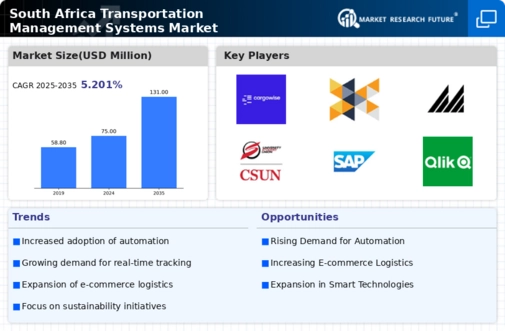Rising Demand for Efficiency in Logistics
The transportation management-systems market in South Africa is experiencing a notable surge in demand for enhanced efficiency within logistics operations. Companies are increasingly seeking solutions that streamline their supply chain processes, reduce operational costs, and improve service delivery. This trend is driven by the need to remain competitive in a rapidly evolving market. According to recent data, logistics costs in South Africa account for approximately 12% of the GDP, indicating a significant opportunity for optimization. As businesses strive to minimize these costs, the adoption of advanced transportation management systems becomes essential. These systems facilitate better route planning, load optimization, and real-time tracking, ultimately leading to improved customer satisfaction and operational performance.
Emergence of Collaborative Logistics Models
The emergence of collaborative logistics models is reshaping the transportation management-systems market in South Africa. Companies are increasingly recognizing the benefits of collaboration with other businesses, suppliers, and even competitors to optimize their logistics operations. This approach allows for shared resources, reduced costs, and improved service levels. Collaborative logistics can take various forms, such as shared warehousing or joint transportation initiatives, which enhance overall supply chain efficiency. As businesses seek to adapt to changing market dynamics, the adoption of transportation management systems that facilitate collaboration is likely to increase. This trend indicates a shift towards more integrated and cooperative logistics strategies, which could significantly impact the future landscape of the transportation management-systems market.
Growth of E-commerce and Last-Mile Delivery
The rapid growth of e-commerce in South Africa is significantly influencing the transportation management-systems market. As online shopping becomes increasingly popular, businesses are faced with the challenge of efficient last-mile delivery. This segment of logistics is critical, as it directly impacts customer satisfaction and operational costs. Data indicates that e-commerce sales in South Africa have seen a year-on-year increase of over 30%, necessitating the implementation of robust transportation management systems to handle the complexities of order fulfillment and delivery. Companies are investing in technology that enables real-time tracking, route optimization, and inventory management, thereby enhancing their ability to meet consumer demands effectively. This trend underscores the importance of advanced transportation management systems in navigating the evolving landscape of e-commerce.
Increased Focus on Data Analytics and Visibility
In the transportation management-systems market, there is an increasing emphasis on data analytics and visibility. Companies are recognizing the value of data-driven decision-making in optimizing their transportation operations. By leveraging analytics, businesses can gain insights into their supply chain performance, identify inefficiencies, and make informed adjustments. The ability to track shipments in real-time and analyze historical data allows for better forecasting and resource allocation. In South Africa, where logistics challenges are prevalent, the integration of data analytics into transportation management systems is becoming a necessity. This trend not only enhances operational efficiency but also supports compliance with regulatory requirements, thereby driving growth in the transportation management-systems market.
Government Initiatives Supporting Transportation Innovation
Government initiatives in South Africa are playing a crucial role in fostering innovation within the transportation management-systems market. Policies aimed at enhancing infrastructure and promoting technological advancements are encouraging businesses to invest in modern transportation solutions. For instance, the South African government has allocated substantial funding towards improving road networks and logistics hubs, which directly impacts the efficiency of transportation systems. Furthermore, initiatives aimed at reducing carbon emissions are prompting companies to adopt more sustainable practices, thereby increasing the demand for transportation management systems that can support these goals. The alignment of government policies with industry needs suggests a favorable environment for growth in the transportation management-systems market.

















